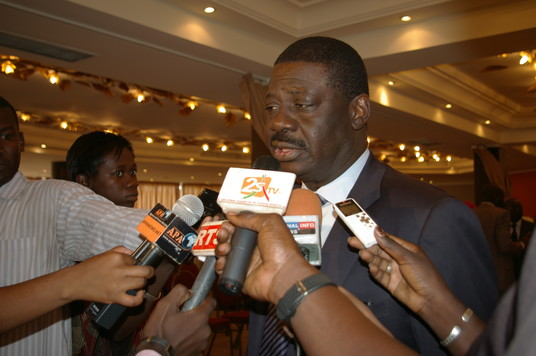
The Conference on professionalization of sport in Africa organised by CIES and Cheikh Anta Diop University (UCAD) on October 14th in Dakar was extremely successful. Over 200 participants discussed themes related to this essential process for the sports organisations of the African continent.
The ten speakers at the three round tables and the conference participants discussed the responsibilities of the stakeholders of professionalization, the need to create innovative projects to develop professionalization and the role the media can play in this major project.
Clearly, the purpose of the conference was not to find miracle solutions for a quick breakthrough and assured success of professionalization of sport in Africa. It principally allowed the participants to identify inhibitors to this process and to explore certain pathways offering sports organisations the possibility of overcoming the first obstacles to success.
The first round table emphasized the difficulty of making the State the sole driving force for professionalization. Even if the State should be present, it cannot bear the full financial weight owing to the economic situation of the countries concerned and to other budget imperatives such as education or health. Sports organisations (federations, leagues, associations, clubs) must therefore be proactive and creative, like the Diambars Association or the Dakar Sacré Cœur.
The discussions during the second round table provided a few practical examples of professionalization. There were some questions about the "business model" that would be best suited to Africa. Several participants considered that training of players could allow gradual development of professionalization while ensuring both a breeding ground for athletes for national clubs and training compensation for the training clubs (international transfers in particular towards Europe). Some participants were opposed to this model, considering that - in the current circumstances - the best players, i.e. the only ones able to inspire enthusiasm and support from the public, are going to leave their home countries anyway. Several participants emphasized the importance of giving clubs a strong image, rooted in their communities, so as to inspire interest and passion. They quoted the example of Senegalese wrestling, at the heart of popular enthusiasm for several years now.
The theme of the "quality performance" was at the heart of the discussions of the third round table. Certain speakers wondered about the relevance of uniform and concomitant professionalization of first league football clubs. To ensure that sport offers a quality performance, should all clubs be promoted in the same way? Or should we start by promoting those clubs that offer a good image, that implement thorough management principles and that develop their infrastructures? Several participants were in favour of this "elitist" approach, which would reward the "best students" - the most innovative clubs - for their efforts to manage and promote quality performance.
Other presentations went into more detail on the theme of the sports "performance". For the majority of participants, professionalization can be implemented only if sports organisations are able to offer interesting and captivating competitions, able to mobilise the interest of the public, both in stadiums and on television. The end of monopolies in the audiovisual media and the press in many African countries could offer a favourable environment. This involves an effort on the part of all the stakeholders. Federations, associations and clubs must offer sport performances and infrastructures that appeal to the spectator and that encourage him to return to the stadium. Television must modify the format of its sports broadcasts - which are often limited to background programming - as well as the quality of broadcasts. That is how it will be able to attract viewers and advertisers and ensure their loyalty.
In conclusion, the conference, covered by many representatives of the media, reflected on the professionalization of sport with an open-minded approach, avoiding hackneyed phrases and "ready-made" solutions. It allowed participants a broad exchange of views on the complexity of the theme - which also poses many problems in Europe although it is considered as the continent of all successes - while encouraging them to be pragmatic and creative. Actually, there is no single professionalization model, and professionalization clearly requires the involvement of all stakeholders.
This website uses cookies – limited to technical and analytical cookies – in order to allow your browsing and enhance your experience.
For more information, please see our cookie policy and our privacy notice.